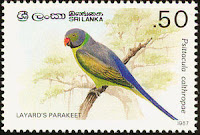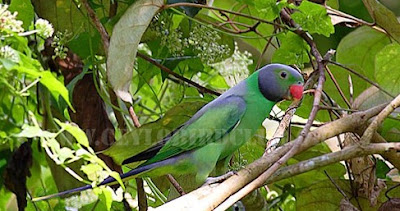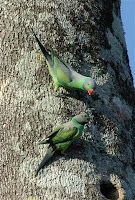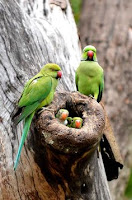Layard’s Parakeet - Psitacula calthropae
(Endemic bird in Sri Lanka)
(Emerald-collared Parakeet)
Sinhalese - Alu Girawa
Tamil - Killi
(Endemic bird in Sri Lanka)
(Emerald-collared Parakeet)
Sinhalese - Alu Girawa
Tamil - Killi
Smaller than a Common Mynah, but with a longer tail, this lovely
parakeet is easily recognized by its lavender-grey head and mantle,
broad emerald green collar and deep cobalt blue tail. The male has a
scarlet red beak while that of the female is black.Young of both sexes
are green all over with a darker head. Their beaks are orange-red in
colour initially.
The Layard’s Parakeet is a bird of forest and well wooded areas. It
is not uncommon in suitable habitat in the wet low country and the hills
up to about 1700 metres. It is rather local in the dry zone but occurs
in forested areas such as Ritigala and Wasgomuwa National Park and the
eastern foothills. The species generally keeps to the upper and mid
storey levels of foliage and is rarely destructive to paddy like the
other parakeets. It moves about in pairs or small flocks. The call is a
harsh kee-kee-kee, rather overpowering when heard at close quarters. In
flight, an aak, ak-ak call is often uttered. This call combined
with the presence of a shorter tail than the other parakeets’ makes it
easy to identify in flight. The bird is very adept at flying at high
speed between trees avoiding them. The food consists of fruit, seed,
buds and other leafy matter. The plumage camouflages the bird so much
that a whole flock may be feeding in a well foliaged tree unnoticed
until calls are uttered.
The breeding season is from about January to May with a secondary season
from July to September. The eggs are laid in a natural cavity or a
disused nest of a barbet or woodpecker, generally high up in a tree. Two
to three white eggs are laid. Both sexes share incubation duties and
feed the young.





No comments:
Post a Comment